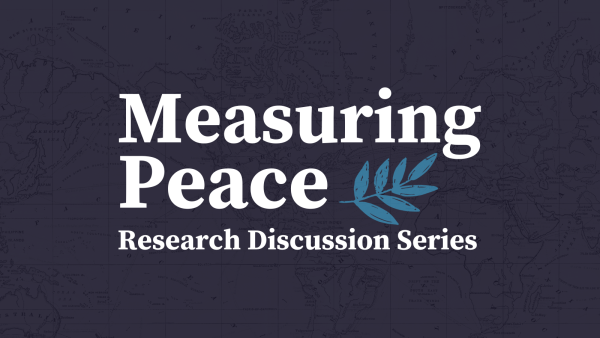Measuring Peace: Research Discussion Series

This program is co-sponsored by the Mershon Center for International Security Studies, Corrymeela Community, Northern Ireland Executive, Ulster University, and University of Bradford
Is peace measurable? This presentation series brings together researchers, practitioners, and policy specialists across disciplinary backgrounds to explore the diverse and myriad ways in which peace is defined and studied.
Working from an internationally recognized Peace Studies paradigm rooted in the social sciences, Measuring Peace is premised on the belief that durable peace requires more than the absence of active conflict and violence. Rather, an enduring “positive peace” must be collaboratively cultivated through multi-level interventions on local, national, and global scales. Peace-building processes are therefore complex, non-linear, and highly fluid, and require comprehensive social, political, economic, and structural strategies.
Featured speakers in this series will present innovative approaches to the study and practice of peace around the world— and how scholarly research and analysis can help to shape effective policy and intervention strategies on the ground. Topics covered during the 2023-2024 series will include identifying micro-dynamic and everyday indicators of peace, tracking peace accord implementation, tackling paramilitarism, and promoting social healing.
Graduate students who attend at least 2 webinars and the all-day Everyday Peace Indicator workshop (https://www.everydaypeaceindicators.org/) with Dr. Roger MacGinty in March 2024 will receive a Mershon Certificate in Measuring Peace.
Guiding Questions for this Series:
- What does it mean to assess peace? What kinds of working definitions and analytical metrics can we set to make “peace” a discrete and measurable research subject?
- Which kinds of inter/disciplinary research methodologies are most generative for doing peace research? What are the benefits and limitations of different models?
- How can we productively speak to and across historically- and geographically-specific cases of violent conflict in order to make broader claims about what it means to achieve peace?
Autumn 2025
November 19, 2025, 12:00 to 1:30pm (Virtual Event)
Dr. Clara Voyvodic
Measuring Peace: Dr. Clara Voyvodic on rebel governance and politics of access
Dr. Clara Voyvodic discussed rebel governance and politics of access. Voyvodic is currently a Lecturer in Peace Studies at the University of Bradford. Before joining the University, Clara was a Senior Research Fellow at the University of Bristol and chaired the Peace, Conflict, and Violence Research Group at the Global Insecurities Centre (GIC). She holds a PhD in International Relations from the University of Oxford, and her professional experience spans the international humanitarian and security sectors, including roles in human rights protection, anti-corruption monitoring, and fugitive investigation. She is a Fellow at the Centre for Armed Groups based in Geneva and a Fellow at the Civil Wars Pathways at the University of York. Some of her recent work on rebel governance, micro dynamics of conflict, and development in Colombia and Northern Ireland, can be found in International Studies Quarterly, Security Dialogue, and Cooperation and Conflict.
Spring 2024
January 31, 2024, 12:00pm to 1:30pm (Virtual Event)
Dr. Josefina Echavarría Alvarez
Measuring Peace: Implementing Colombia’s Final Accord
This program is co-sponsored by the Mershon Center for International Security Studies, Pontificia Universidad Javeriana, Corrymeela Community, Northern Ireland Executive, Ulster University, and University of Bradford
The Colombian government and the FARC-EP signed a landmark peace agreement (Final Accord) in 2016. With a comprehensive and multi-dimensional agenda, it established a way out of the war and provided a plan to tackle the roots of historical cycles of violence and build a lasting peace. The Kroc Institute for International Peace Studies’ Barometer Initiative serves as the official monitor for the Final Accord’s implementation. This is the first time a university-based research center has played such a direct role in supporting the implementation of a peace agreement, and it is the first time researchers are measuring the implementation of a peace accord in real time.
This presentation and discussion will offer a conceptual framework for how peace accords are part of larger peacebuilding efforts, and how they relate to social transformation. It will overview the Kroc Institute’s Peace Accords Matrix, its various research methodologies, and the unique ways the database is being used to support the Barometer Initiative in Colombia. Finally, the relationship between measuring peace and peace accord implementation will be explored.
Fall 2023
October 25, 2023, 12:00pm to 1:30pm (Virtual Event)
Adele Brown and Claire Hazelden
Tackling Paramilitarism in Northern Ireland
Peace is "troubled" in Northern Ireland. Twenty-five years after the Good Friday Agreement, violence remains pervasive throughout the six counties. Youth report endemic violence as generating the most significant adversity in their daily lives. Between 20-50% of people in Northern Ireland are affected by paramilitarism but, for some of the most disadvantaged communities, exposure is double that of the population average. Why has paramilitarism activity continued to persist in Northern Ireland, how is it affecting youth, and how has the government been responding?
This presentation spotlights NI Executive’s Tackling Paramilitarism, Criminality and Organised Crime Programme, a government sponsored, multi-level action research initiative. Using scientific evidence within a public health framework, a wide range of projects interface to prevent violence, tackle paramilitarism, and contribute to the UN Sustainable Development goals. This seminar is especially relevant for researchers interested in learning how academic research can inform government policy and help shape practical interventions.
September 27, 2023, 12:00pm to 1:30pm (Virtual Event)
Roddy Brett and Roger Mac Ginty
Getting on with it: Using multiple qualitative methods to capture dynamic contexts
This presentation and discussion draws on the "Getting on with it: Understanding the micro-dynamics of post-accord intergroup social relations". The project seeks to examine micro-group dynamics in localities in Colombia, Lebanon and Northern Ireland and has used a number of field research methods to try to capture these dynamics. The presentation and discussion will cover the journey from initial desk-based proposal that included a research design to the challenges of conducting research in contexts that present challenges in terms of logistics, security and other factors that demand an agile approach to methodology.
